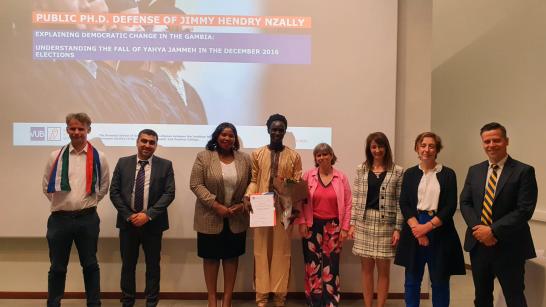
We are pleased to announce that on 16 May 2022, Jimmy Hendry Nzally successfully defended his PhD thesis entitled: “Explaining Democratic Change in The Gambia: Understanding the Fall of Yahya Jammeh in the December 2016 Elections”. The PhD defence started with a welcome note by the Chair, Prof. Ilke Adam (Brussels School of Governance). After his presentation, Jimmy answered questions from the jury which consisted of Prof. Momodou Sallah, Ph.D (De Montfort University, Leicester), Prof. Jussi Laine, Ph.D (University of Eastern Finland), and Mohammad Salman, Ph.D (Brussels School of Governance, VUB). After that, Jimmy's PhD Promotors Prof. Angela Tacea and Prof. Florian Trauner (Brussels School of Governance, VUB) gave a speech reflecting on their excellent collaboration with Jimmy over the years. Finally, the PhD defence was concluded by Jimmy's speech in which he thanked his supervisors, members of the jury, family and friends, for their support. He also thanked the Embassy of The Gambia for its collaboration and support.
The Brussels School of Governance would like to congratulate Dr Jimmy Hendry Nzally with this wonderful achievement. We are particularly proud that Jimmy overcame all the hurdles that he did to lead to the successful completion of his PhD trajectory. Below you can read more about his PhD thesis.
Abstract
Even if only a small country with less than 2 million inhabitants, the Gambia is a relevant example to study contemporary democratic change in the African context. This PhD project is a timely and theory-driven study on how democratic change has been possible in the Gambia in 2016/17. A self-styled dictator since 1994, Yahya Jammeh, lost a democratic election in the country that he had vowed to rule for a ‘Billion Years’. Achieving democratic change in Africa through an election is a contrast with (often) better-known internal or external military coups and international interventions such as the Arab Spring (Tunisia, Libya, and Egypt in 2011), Ivory Coast’s disputed presidential election in 2011, Burkina Faso’s civil and military uprising in 2014 and not least the palace coup in Zimbabwe that ended decades of Robert Mugabe’s rule in 2017. Democratic change through the ballot box has hence been less frequent and is particularly rare in a country that is under such tight control such as the Gambia under the Jammeh regime.
This PhD research employed qualitative methodology, notably extensive field research in Africa and that is a broad range of expert interviews with Gambian policymakers, journalists, and other key stakeholders. In total, the work builds upon over 50 transcribed interviews and uses primary sources never published before (such as unpublished memos, memoirs, diary, etc.). This material forms the core of the empirical chapters. In addition, I have also drawn from my interdisciplinary academic background in history by applying ‘historiography’ and in linguistics and literary studies by carefully working with existing literature and doing postcolonial theorizing.
The theoretical framework is drawn from a variety of well-known works on democratization and regime change. I have as well included Samuel Huntington's (1991) Third Wave Democratization, Schumpeter’s (1950) Theory of Democratization and Dahl’s (1971) Polyarchy. These models (structural, transition and/or sociological) seek to explain a shift away from an authoritarian regime to a democracy. However, most concepts of democratic change have a kind of ‘Western’ bias given that they were written by Western scholars who may lack an understanding of local dynamics. This project is therefore well-positioned to make a contribution to the literature. It seeks to adapt Western-generated theories to an African context and a salient case of democratic change.
The empirical insights start by examining the long-term developments. The first part looks at how Jammeh managed to gain and consolidate power (e.g., by systematically eliminating checks and balances). The election did not come out of the blue. The research highlights that certain long-term developments including a lack of economic progress, substantial emigration and widespread human rights’ violations have already undermined the regime’s legitimacy and support. The second empirical part delves into the short term-dynamics presiding and following the 2016 election. A large opposition coalition of seven different political parties united around an independent candidate, Adama Barrow. While president Jammeh initially conceded defeat, he reversed course one week later. He denounced the results and sought to cling to power. However, a dynamic interplay of the newly elected president and the international community – in particular the ECOWAS Community – prevented him from returning to his previous position. He lost his remaining legitimacy as president-elected Adama Barrow was smuggled out of the country by ECOWAS Heads of States to attend the France- Africa Summit in Mali. Abroad, he was sworn into his role as president at the Gambia Embassy in Dakar, Senegal, in January 2017.
Overall, the PhD highlights that democratic change has been possible by a fortunate constellation of domestic and international factors as well as by the mobilization of many Gambians prepared to risk their lives for achieving democratic change.


